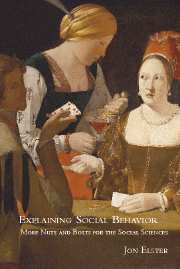Book contents
- Frontmatter
- Contents
- Preface
- Introduction
- I EXPLANATION AND MECHANISMS
- II THE MIND
- III ACTION
- IV LESSONS FROM THE NATURAL SCIENCES
- V Interaction
- 18 Unintended Consequences
- 19 Strategic Interaction
- 20 Games and Behavior
- 21 Trust
- 22 Social Norms
- 23 Collective Belief Formation
- 24 Collective Action
- 25 Collective Decision Making
- 26 Organizations and Institutions
- Conclusion: Is Social Science Possible?
- Index
21 - Trust
from V - Interaction
- Frontmatter
- Contents
- Preface
- Introduction
- I EXPLANATION AND MECHANISMS
- II THE MIND
- III ACTION
- IV LESSONS FROM THE NATURAL SCIENCES
- V Interaction
- 18 Unintended Consequences
- 19 Strategic Interaction
- 20 Games and Behavior
- 21 Trust
- 22 Social Norms
- 23 Collective Belief Formation
- 24 Collective Action
- 25 Collective Decision Making
- 26 Organizations and Institutions
- Conclusion: Is Social Science Possible?
- Index
Summary
Lowering One's Guard
Egoism, said Tocqueville, is “the rust of society.” Similarly, it is often said that trust is “the lubricant of society.” Everyday life would be impossibly difficult if we could not trust others to do what they say they will do, at least to some extent. Although scholars have defined trust in various ways, I shall use a simple behavioral definition: to trust someone is to lower one's guard, to refrain from taking precautions against an interaction partner, even when the other, because of opportunism or incompetence, could act in a way that might seem to justify precautions. By “opportunism” I mean shortsighted or “raw” self-interest, unconstrained by either ethical or prudential considerations. Typical opportunistic acts that may justify others' taking precautions include telling a lie, cheating on an exam, breaking a promise, embezzling money, being unfaithful to one's spouse, or choosing the noncooperative strategy in a Prisoner's Dilemma.
One may or may not trust oneself to keep a bargain, stay away from alcohol, or keep the ship on a steady course when the Sirens are calling. Distrust of oneself is revealed by precommitment or by the construction of private rules (Chapter 13). These strategies can be costly, however, because of signaling effects. If others observe one instance of such precautionary behavior toward my future selves, they may infer, incorrectly as we saw in Chapter 10, that I lack self-control in general.
- Type
- Chapter
- Information
- Explaining Social BehaviorMore Nuts and Bolts for the Social Sciences, pp. 344 - 352Publisher: Cambridge University PressPrint publication year: 2007

